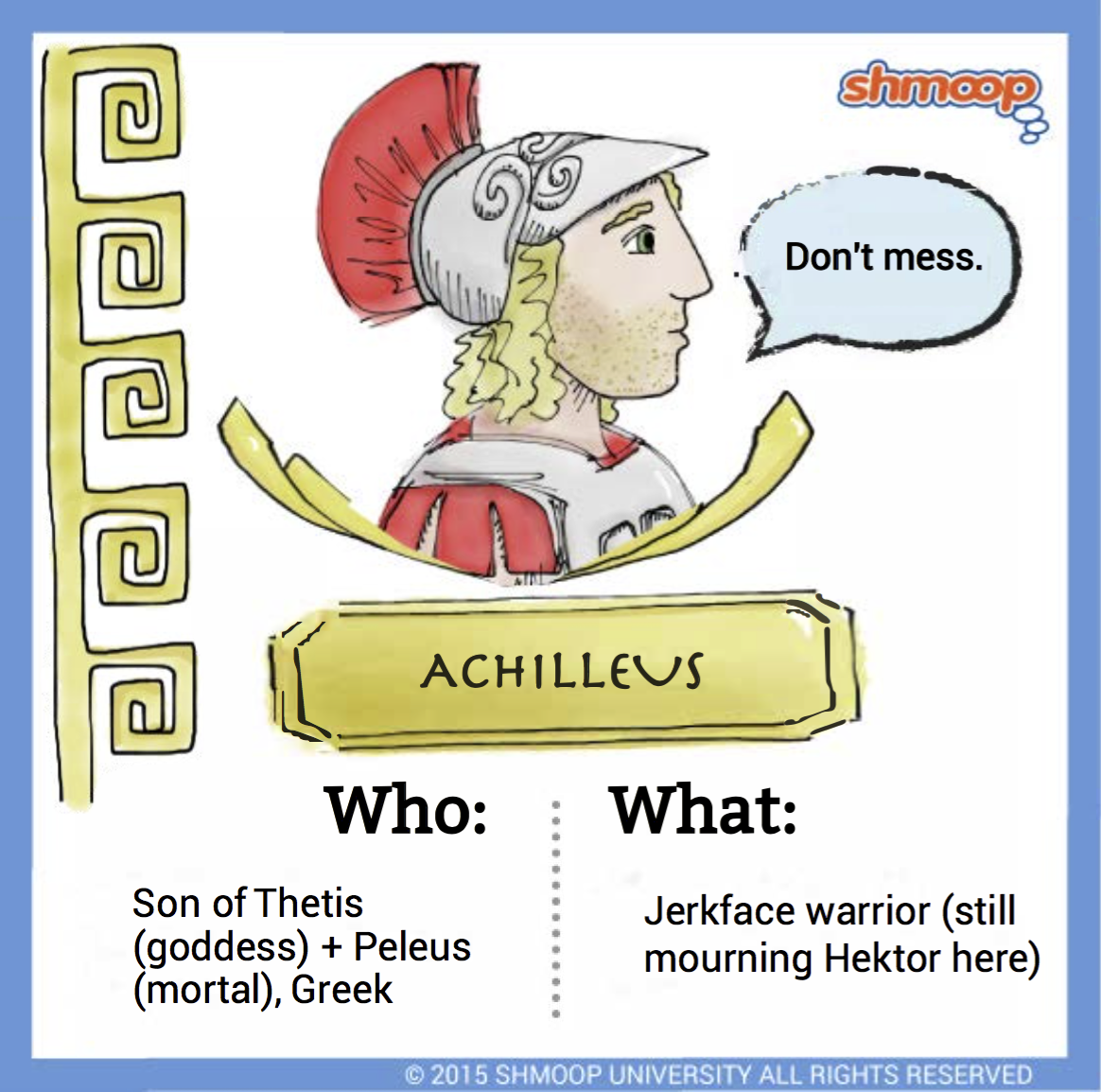Character Analysis

(Click the character infographic to download.)
What a Pedigree
Think of Achilleus like an Ancient Greek Arya Stark—well-born, secretly sentimental, and totally fueled by rage.
To understand Achilleus, you've got to start with his family tree. Many years before the Trojan War, Zeus, king of the gods, developed a crush on Thetis, a sea-goddess. That's when he learned of a prophecy that Thetis would bear a son more powerful than his father. Major turn-off. So Zeus married Thetis off to a mortal, Peleus. Their child was Achilleus. (You can read more about the connection between the marriage of Peleus and Thetis and the origins of the Trojan War in The Backstory's Backstory in our summary of Book 2.)
Because his mother is a goddess, Achilleus is much more powerful than a typical mortal. It also means he has some connections that can pull strings for him when necessary—like when he gets Zeus to help out the Trojans for him. One thing that Achilleus doesn't inherit from his mom is immortality. Forget anything you've heard about Achilleus being invulnerable except in his heel—that's part of a later tradition, not mentioned in the Iliad.
What Achilleus does have is an unusual double fate: he knows that, if he goes home from Troy, he will have a long life without glory. If he stays, he will win great glory, but his life will be cut short:
(Achilleus:) For my mother Thetis the goddess of the silver feet tells me
I carry two sorts of destiny toward the day my death.
Either, if I stay here and fight beside the city of Trojans,
my return home is gone, but my glory shall be everlasting;
but if I return home to the beloved land of my fathers,
the excellence of my glory is gone, but there will be a long life
left for me, and my end in death will not come to me quickly. (9.410-416)
Ugh. Talk about a lose-lose situation.
True Blue
So far, we've been talking mostly about things that Achilleus inherited. What about his actual personality, as an adult? When the Iliad begins, Achilleus has already established himself as an extremely successful warrior. We learn from various sources that he has killed many Trojans, and taken many of their women prisoner. From Andromache, the wife of Hektor, we learn that during this period, Achilleus was usually on his best behavior.
For example, when he killed Andromache's father, he made sure to give him a proper funeral. He has even developed a powerful attachment to Briseis, one of the women he has captured, who is now his live-in girlfriend. This attachment is only equaled—and probably surpassed—by his friendship for Patroklos, his companion since childhood. Achilleus's other human connections are his father, Peleus, who lives back in his homeland of Phthia, and his son, Neoptolemos, who is currently on the island of Skyros. As Achilleus reveals in Book 19, his hope is that, once he dies at Troy, Patroklos will take charge of his son and bring him home to Phthia.
Anger Management
Unfortunately, things don't turn out that way. A major cause of things getting messed up is the fact that Achilleus is extremely emotionally volatile and full of pride. (As you will remember, in the opening line of the poem, Homer reveals that he is going to be talking about the "anger of Peleus' son, Achilleus.")
This anger first reveals itself in Book 1, when Achilleus gets in a huge fight with Agamemnon when Agamemnon threatens to take his girlfriend away. He would have killed Agamemnon then and there if the goddess Athene hadn't stopped him. What he ends up doing is even worse: getting Zeus to help out the Trojans. The fact that tons of his friends get killed doesn't seem to bother Achilleus so long as it helps his ego.
But once Patroklos gets killed, Achilleus's grief is extreme. He swears to get revenge, knowing that it will mean his own death. This time, when he goes into battle, he's out of control, killing guys who are surrendering, fighting with rivers, and so on. But killing isn't enough for him: once Hektor is dead, he repeatedly abuses his corpse.
These brutal actions are the backdrop for Achilleus's slow return to civilized behavior, starting with his hosting of the funeral games, and ending with his dramatic reconciliation with King Priam, when he returns Hektor's body.
Achilleus Timeline